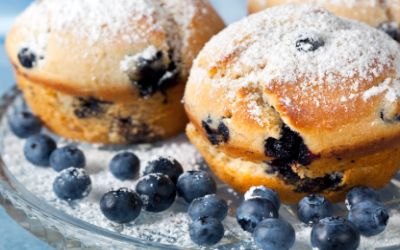Making Weight: Carbohydrate Blocking

Those looking to manage their weight can choose to supplement with ingredients that reduce the glycemic load of their favorite high GI foods. White kidney bean extract (Phaseolus vulgaris) has been shown to delay the digestion of carbohydrates and promote weight loss by inhibiting activity of alpha-amylase enzymes responsible for their digestion. A branded white kidney bean extract (as Phase 2® from Pharmachem Laboratories) has two structure/function claims for starch reduction and weight loss. In a 2011 review, scientists from Medicus Research LLC, Northridge, CA, reported Phase 2 caused weight loss with doses of 500 to 3,000 mg/d, in either a single dose or in divided doses.1 They said clinical studies also show Phase 2 can reduce post-meal spikes in blood glucose levels. Experiments incorporating Phase 2 into food and beverage products found it can be integrated into various products without losing activity or altering the appearance, texture or taste of the food.
A 2009 University of Scranton, PA, study found Phase 2 inhibited starch absorption and starch-induced hyperglycemia in normal and diabetic subjects.2 In vitro, they found it inhibited amylase, thus potentially affecting the absorption of starch carbohydrates.
Resistant starch is starch that bypasses digestion in the small intestine and triggers metabolic shifts as it is fermented by the resident bacteria in the large intestine. Resistant starch tackles weight management by increasing satiety and increasing insulin sensitivity. Resistant starch, along with corn bran, demonstrated increased satiety for two to 24 hours after consumption compared to other forms of fiber, such as polydextrose, in a 2009 study.3
White bread fortified with Hi-Maize, a resistant starch from Ingredion Inc., served at dinner improved glucose tolerance at the subsequent breakfast compared with unfortified white bread.4 Improvements in insulin sensitivity were seen as fast as 30 minutes after eating. A 2010 study found Hi-Maize was the only starch to reduce blood glucose levels 120 minutes after a meal, compared to maltodextrin, whole-grain and high-amylose starches.5
Another 2010 study found Hi-Maize also reduced food intake over a 24-hour period.6 And an earlier study found people eating 5 g (5.4 percent of total dietary carbohydrate) of Hi-Maize resistant starch at breakfast had increased fat oxidation by 23 percent over 24 hours, and therefore could decrease fat accumulation in the long-term.7
The most recent study on Hi-Maize showed it improved fatty acid metabolism within adipose tissue, increased glucose uptake into muscle tissues and stimulated enzymes (hormone-sensitive lipase [HSL], lipoprotein lipase [LPL] and adipose triglyceride lipase [ATGL]) within adipose tissue.8 Reduction in these enzymes is considered a primary defect in adipose tissue that is associated with obesity and type-2 diabetes.
L-arabinose, a natural, poorly absorbed pentose, also helps control glucose absorption. A 1996 study from Japan reported L-arabinose selectively inhibited intestinal sucrase (an enzyme that digests sucrose) activity in vitro and suppressed glycemic response after sucrose ingestion in mice and rats.9 And a 2001 rat study from Japan found L-arabinose supplementation reduced adipose tissue, plasma insulin and triacylglycerol concentrations, suggesting it inhibits intestinal sucrase activity, thereby reducing sucrose absorbtion, and consequently decreasing lipogenesis.10
Pharmachem Labs combined L-arabinose with chromium, which has the capability to help with insulin control, in its Phase 3 Sugar Controller. In a 2009 unpublished, 28-day, pilot study of 10 human subjects from Integrative Health Technologies, Phase 3 inhibited sucrose absorption by 25 percent.
Along with thermogenesis, specific kinds of seaweed can also block carbohydrate absorption. InSea2, a polyphenolic algal extract made by innoVactiv Inc. from two different types of brown seaweed (Ascophyllum nodosum and Fucus vesiculosus), can also help reduce carbohydrate absorption by inhibiting the digestive enzymes alpha-amylase and alpha-glucosidase, which blocks both starch and sugar. A double blind, randomized, crossover, placebo-controlled trial from 2011 found InSea2 reduced insulin by 12.1 percent and reduced insulin sensitivity by 7.9 percent compared to placebo.11
ID-alG, a brown seaweed (Ascophyllum nodosum) extract from Nexira, also inhibits lipase and alpha-amylase and contains levels of original marine polyphenols, minerals and trace elements. A 2009 study from Bio Serae Labs, Rouen, France, showed ID-alG decreased mean body weight gains, decreased the percentage of body fat mass and improved triglyceride blood level compared to control in high-fat-fed Sprague-Dawley rats.12
References listed on the next page.
References:
1. Barrett ML, Udani JK. A proprietary alpha-amylase inhibitor from white bean (Phaseolus vulgaris): a review of clinical studies on weight loss and glycemic control." Nutr J. 2011 Mar 17;10:24.
2. Vinson, J. A.; Kharrat, H.A., Shuta, D. Investigation of an Amylase Inhibitor on Human Glucose Absorption after Starch Consumption" The Open Nutraceuticals Journal, 2009, 2, 88-91
3. Willis HJ et al. Greater satiety response with resistant starch and corn bran in human subjects. Nutr Res. 2009 Feb;29(2):100-5.
4. Nilsson AC et al. "Including indigestible carbohydrates in the evening meal of healthy subjects improves glucose tolerance, lowers inflammatory markers, and increases satiety after a subsequent standardized breakfast." J Nutr. 2008 Apr;138(4):732-9.
5. Bodinham CL, Frost GS, Robertson MD. " Acute ingestion of resistant starch reduces food intake in healthy adults." Br J Nutr. 2010 Mar;103(6):917-22.
6. Higgins JA et al. "Resistant starch consumption promotes lipid oxidation." Nutr Metab (Lond). 2004 Oct 6;1(1):8.
7. Anderson GH et al. " Relation between estimates of cornstarch digestibility by the Englyst in vitro method and glycemic response, subjective appetite, and short-term food intake in young men." Am J Clin Nutr. 2010 Apr;91(4):932-9.
8. Robertson MD et al. "Insulin-Sensitising Effects on Muscle and Adipose Tissue after Dietary Fiber Intake in Men and Women with Metabolic Syndrome." J Clin Endocrinol Metab. 2012 Jun 28.
9. Seri K et al. L-arabinose selectively inhibits intestinal sucrase in an uncompetitive manner and suppresses glycemic response after sucrose ingestion in animals." Metabolism. 1996 Nov;45(11):1368-74.
10. Osaki S et al. L-arabinose feeding prevents increases due to dietary sucrose in lipogenic enzymes and triacylglycerol levels in rats." J Nutr. 2001 Mar;131(3):796-9.
11. Paradis ME, Couture P, Lamarche B. A randomised crossover placebo-controlled trial investigating the effect of brown seaweed (Ascophyllum nodosum and Fucus vesiculosus) on postchallenge plasma glucose and insulin levels in men and women." Appl Physiol Nutr Metab. 2011 Dec;36(6):913-9.
12. Terpend K et al. " Effects of ID-alG on weight management and body fat mass in high-fat-fed rats." Phytother Res. 2012 May;26(5):727-33. doi: 10.1002/ptr.3619.
About the Author(s)
You May Also Like






.png?width=800&auto=webp&quality=80&disable=upscale)